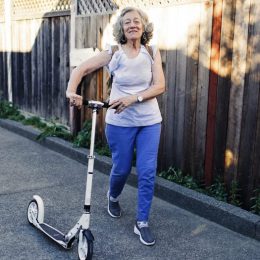Why Every Retiree Should Have a Job
Part-time work benefits your mind, body, and bank account. Find the right role with these tips.

Everyone looks forward to retirement. After working hard for four or five decades, it’s finally time to embrace a more leisurely lifestyle. No more early alarms, meetings, or deadlines. It’s just you—out on the golf course, in the garden, taking care of your grandkids. It’s perfect.
Except, what if it’s not? What if the things you’ve looked forward to all these years—more time for your hobbies, more time to travel, more time to relax—aren’t enough to sustain you? It’s a common question among retirees, which is why more and more people are abandoning full-time retirement in favor of part-time work.
“People are living longer and healthier lives,” says Roy Cohen, a career counselor and executive coach in New York. “And they’re realizing that work is central to maintaining a sense of purpose and joy.” For many people, continuing to work in some capacity is also critical to their financial security.
According to a recent Pew Research Center analysis, nearly 20 percent of Americans ages 65 and older are employed full- or part-time. That’s a big increase since 2000, when just 13 percent of older Americans were working. Another survey found that 41 percent of American workers believe they’ll gradually cut back their hours in retirement, rather than abruptly stop working altogether.
But is a post-retirement gig really worth your while? Experts say yes. Here are the four biggest perks, plus how to jumpstart your own job search.
1. It Provides a Sense of Purpose
Some people find they lose their sense of purpose and community in retirement, says Chellie Campbell, author of The Wealthy Spirit and creator of Financial Stress Reduction Workshops. “More than anything, work makes you feel rewarded—like you’re making a difference serving someone else,” says Campbell, who continues to coach, teach classes, and write in her later years. “I work a lighter schedule than I have in the past, and I love my life!”
2. It Connects You With People
“Part-time work also adds structure to your days,” Campbell says. It gives you opportunities to engage and stay connected with your community, which is extremely important in helping you avoid feeling isolated or alone.
Older Americans tend to watch more TV than younger people—four hours or more per day, according to the U.S. Bureau of Labor and Statistics. Having a job helps you get out and use your brain, which is crucial for continued good health. There are also physical perks to certain jobs, especially if it’s a more active role like dog walking or working in a retail store, Cohen says.
3. It Gives You a Financial Cushion (or More Spending Money!)
It can be hard to support 20-plus years of retirement with 40 or so years of work, Cohen explains. “Assets have shrunk, which is a huge concern for many retirees and for those approaching traditional retirement age,” he says. “And the ability to save enough to keep up with inflation is a challenge too.” Plus, according to a Demos survey, middle-income Americans ages 50 and older are carrying more credit card debt on average than younger people.
Part-time work, along with Social Security, pensions, or retirement savings, can help people put together a more comfortable retirement, Campbell says. It also doesn’t hurt to have extra money to spend on fun life experiences now that you have more time and freedom.
4. You Realize How Much You Have to Offer
A major benefit to finding work in your golden years is the satisfaction of sharing all the knowledge you’ve accumulated. “Think about all the experiences you’ve had—having a corporate career, navigating a job loss, going through a divorce—it’s almost your duty to share what you’ve learned with younger generations!” says Susie Moore, a career coach and creator of the Side Hustle Academy. “It’s your time to be creatively free and just focus on you.”
Campbell agrees: “If you’ve run a business or home, motivated your kids, know how to start a business, there’s someone out there who can use your knowledge.” You just have to learn how to market and sell your ideas—which is easier than it sounds. Read on for some ideas.
What Kind of Work Should You Do?
There are three main areas of work most retirees get involved in, says Jane Finkle, a career coach in Philadelphia. One is essentially a continuation of your career—such as consulting for a company in your industry or going in a couple days per week to your old job. “Employers often value someone with experience and maturity—but not at the cost of a full-time worker,” says Kevin Gallegos, a consumer finance expert and vice president of Phoenix operations at Freedom Financial Network.
Many retirees also find a part-time position in the retail industry, like a grocery store or clothing shop. This is a good choice if you want to be around lots of people but you’re not necessarily looking for a desk job, Finkle says. Retail companies especially need help around the holidays. If you live near a seasonal community or resort, they may need extra hands during the high seasons.
These positions can really pay off. Working just 12 hours per week at $10 an hour would gross close to $500 in a month, Gallegos points out. Plus, many retail stores offer employee discounts on merchandise. “So if you work at a place where you regularly shop, that’s an added financial benefit,” he says.
Finally, many retirees seek a role at a nonprofit or organization that gives back to the community. Finkle suggests checking out Encore.org, a website that’s devoted to helping people ages 50 and older find a “second act” that contributes to the greater good.
Subscribe to our newsletter
It's quick and easy. You could be one of the 13 million people who are eligible.
Already a member? Click to discover our 15,000+ participating locations.
Follow Us
Not Sure What Passions You Want to Pursue? Try This
Think about what brings you joy, Moore suggests, even going back to what made you happy as a kid. Ask yourself: “What do I love to do in my free time? What problems am I good at solving? What do people ask me about? What comes naturally for me?” Those kinds of questions can help you narrow down what area you may want to look into for a second career.
If you’re still having trouble, maybe one of these ideas will strike your fancy:
Tutor or teacher. “Spread the word that you are willing to tutor or teach a language if you have the skills,” Gallegos suggests. Also, contact local community colleges or adult education programs to see if they have part-time teaching opportunities.
Dog walker. If you’re physically able, this is a great way to gain some exercise and social interaction at the same time. “As a proud doggy parent, I can say unequivocally that you meet new and interesting people on your walks,” Cohen says. You can advertise your services in local media, online neighborhood marketplaces, and local bulletin boards at rec centers or grocery stores.
Caterer. If you are interested in food, look into contract work helping a catering company, Gallegos suggests. This type of job can be especially in demand around the holidays.
One-person retailer. If you have a creative talent—like knitting scarves or making jewelry—look into selling your items at a craft fair, or via online services such as Etsy or ArtFire, Gallegos suggests.
Driver, caregiver, or helper to the elderly. This is a rewarding way to give back. “The very oldest among us will need increasing help and support,” Cohen says. For those who want to remain independent, having a person to help with errands, driving, personal hygiene, and other activities will become essential.
Tour guide or docent. See if local attractions in your area are hiring tour guides, Cohen suggests. This is a great way to get exercise, meet interesting people from around the world, and get paid for having fun.




